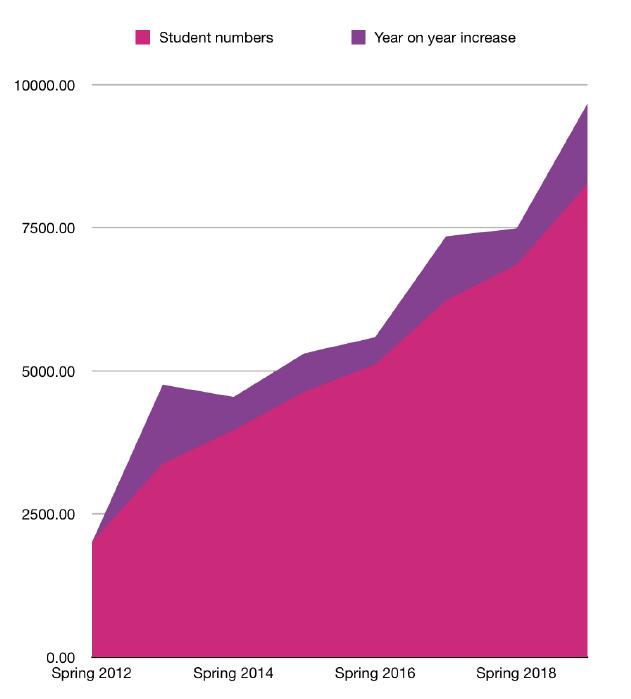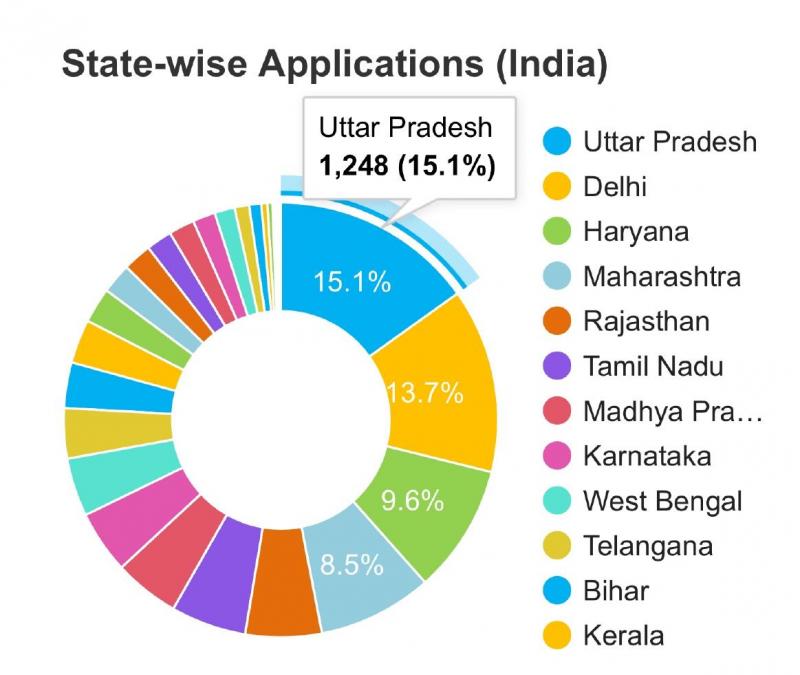
The Law School Admission Test (LSAT) India - used as an admission test for 52 Indian law schools but primarily having acted as a feeder for JGLS Sonepat - has seen 8,268 applicants this year, according to an internal email sent by JGLS VC Prof Raj Kumar (full email published below).
Since its inception, LSAT (and JGLS) have zealously guarded the number of LSAT test takers, despite several requests from us for disclosure, but according to Kumar’s email, circulated within the school, a copy of which was leaked to us:
I am most delighted to inform you that the Jindal Global Law School applications process for its UG programmes is completed. With a profound sense of happiness and satisfaction, I wish to report to you that we have 8268 paid LSAT registrations for admissions to the JGLS in 2019. This has resulted in an impressive and unprecedented 20.5% increase since the last year.
After receiving a copy of the email, we reached out to Kumar for comment, and he confirmed that only 350 had taken the LSAT in 2009.
The new, larger, number is, of course, still way shy of the 60,000-odd who sat the Common Law Admission Test (CLAT) this year (or even the 20,000 who appeared for the competing NLU Delhi All India Entrance Test (AILET)).
But all told, it’s not a bad effort for a test that has had to prove itself against its competitors and currently charges Rs 3,800 per pop, with a big pool of applicants being important for a law school wishing to attract strong candidates (even if LSAT India toppers who also perform well in the CLAT or AILET are nowhere near guaranteed to join JGLS).
Kumar said that while lots of other Indian law schools accepted LSAT results (52 according to LSAT’s website), JGLS was “100%... the only law school in that list which takes LSAT as exclusive exam” (at least for the 600 seats of its 5-year course; for the 3-year LLB course and 1-year LLM, JGLS also accepts Delhi University LLB/LLM entrance test and CLAT-PG scores, he said).
In 2011, we had reported that the LSAT was accepted by 25 colleges, up from only four in 2010.
Marketing an exam
The growth is in part a testament to solid marketing, not just from LSAT but also JGLS.
Disclosure: Both JGLS and LSAT have been occasional advertisers with Legally India over the past years.
As Kumar pointed out in his email, JGLS had been “strategically tying up with all the noticeable players in the state of Bihar, Career Launcher, CLAT Path, and CLAT Possible and interacting with all the students inside the coaching institutes covering over 700 students in the span of 3 days”.
“This was a very significant strategic initiative,” he wrote about the programme headed up by admissions head Prof Anand Prakash Mishra.
We asked Kumar what exactly this entailed, and he explained: “They [the coaching centres] let us in, and we pay for advertisements, we put our information in their printed materials. They have their booklets and printed materials, you pay for advertisement and outreach.”
LSAT itself (administered by Pearson Vue in India, under licence from the US’ venerable Law School Admission Council (LSAC)) would have also run advertisement campaigns with coaching centres, Kumar said.
Similar strategies were used in other states, according to the email:
- in UP: campaigns with “market leader” CLAT Possible;
- in Tamil Nadu: “three market leaders in the coaching industry” Sriram Law Academy, Co-draft Academy of Law and Career Launcher, as well as Kumar addressing the Loyola College Convocation in Chennai of 12,000 students and parents);
- in Rajasthan: a tie-up with the CLAT prep coaching centre,
- in Madhya Pradesh: a tie-up with LegalEdge, Career Launcher and School of Skills Vidhigya in Indore, to conduct an open house and classroom sessions.
Regional breakdowns

Kumar’s email also highlighted that while the Chennai test centre was the fastest growing (40% year-on-year).
Nevertheless, North Indian states still made up around 50% of LSAT takers, with the largest number of LSAT takers from:
- Uttar Pradesh (15.1% of total applicants, with 30% year-on-year growth)
- Delhi (13.7%)
- Haryana (9.6%)
Maharashtra was next up at 8.5%, followed by Rajasthan and (now) Tamil Nadu.
threads most popular
thread most upvoted
comment newest
first oldest
first
Makes one wonder if one takes away the students, would ranking of various colleges/universities be maintained, thus showing whether the success of a student is because of his/her intrinsic discipline, work ethos and comprehensive power, or is the university actually training students.
Tier 1
1. NLSIU
2. NLUD (as a result of NIRF, though some still place NALSAR at 2)
3. NALSAR
4. NUJS
Tier 2
5. NLUJ
6. NLIU
7. GNLU
8. MNLU Mumbai (over-ranked IMO)
Tier 3
9. JGLS (if affordable)
10. RGNUL
11 RMLNLU
12. MNLU Nagpur (possibly over-ranked)
13. MNLU Aurangabad (possibly over-ranked)
14. NLUO (possibly under-ranked)
Tier 4
13. HNLU(possibly under-ranked)
14. CNLU
Tier 5
15. All other NLUs all placed at par.
NLSIU/NALSAR/NLUD/NUJS/JGLS (if fee not an issue)/NLUJ/NLIU/GNLU
Tier 2
HNLU/RMLNLU/RGNUL/NUALS/ MNLU Mumbai/ SLS Pune/ GLC Mumbai/ ILS Pune/ NLUO/CNLU/Nirma/Christ/ USLLS GGSIU
Tier 3
NUSRL Ranchi/NLU Asam/ DSNLU Vizag/ HPNLU Shimla/ MNLU Nagpur/ MNLU Aurangabad /BHU / AMU/ Allahabad/ Lucknow/ VIPS /UILS PU Chandigarh/SOEL Chennai / Bennett Greater Noida/ UPES /ULC Bangalore /Calcutta University /New Law College Pune
Tier 4
Kurukshetra /MDU / Amity/ VIT Chennai/ ICFAI/ Osmania/ MS Ramaiah/ Lloyd / SRM/Sharda /Galgotia /Lovely etc. etc.
Can anybody make it better??
www.thenewsminute.com/article/nalsar-uni-hyd-summoned-national-bc-commission-over-non-implementation-quota-102724
www.newindianexpress.com/cities/hyderabad/2019/may/31/nalsar-university-vice-chancellor-asked-to-appear-before-ncbc-on-june-4-1984119.html
www.business-standard.com/article/news-ani/ncbc-issues-notice-to-nalsar-for-not-implementing-obc-bc-quota-in-admission-119053001033_1.html
www.devdiscourse.com/article/national/542589-nalsar-served-ncbc-notice-for-non-implementation-of-reservation-rules
www.deccanchronicle.com/nation/current-affairs/310519/nalsar-university-served-notice-on-backward-classes-quota.html
threads most popular
thread most upvoted
comment newest
first oldest
first